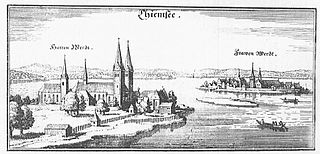
Sigmund Christoph von Waldburg-Zeil-Trauchburg (Munich, 28 August 1754 - Salzburg, 7 November 1814) was a German Roman Catholic bishop. He was the last bishop of Chiemsee and apostolic administrator of Salzburg. [1] [2]

Sigmund Christoph von Waldburg-Zeil-Trauchburg (Munich, 28 August 1754 - Salzburg, 7 November 1814) was a German Roman Catholic bishop. He was the last bishop of Chiemsee and apostolic administrator of Salzburg. [1] [2]

Samuel Wilberforce, FRS was an English bishop in the Church of England, and the third son of William Wilberforce. Known as "Soapy Sam", Wilberforce was one of the greatest public speakers of his day. He is now best remembered for his opposition to Charles Darwin's theory of evolution at a debate in 1860.

The Electorate of Cologne, sometimes referred to as Electoral Cologne, was an ecclesiastical principality of the Holy Roman Empire that existed from the 10th to the early 19th century. It consisted of the Hochstift—the temporal possessions—of the archbishop of Cologne, and was ruled by him in his capacity as prince-elector. There were only two other ecclesiastical prince-electors in the Empire: the Electorate of Mainz and the Electorate of Trier. The archbishop-elector of Cologne was also arch-chancellor of Italy and, as such, ranked second among all ecclesiastical and secular princes of the Empire, after the archbishop-elector of Mainz, and before that of Trier.

Cuius regio, eius religio is a Latin phrase which literally means "whose realm, their religion" – meaning that the religion of the ruler was to dictate the religion of those ruled. This legal principle marked a major development in the collective freedom of religion within Western civilization. Before tolerance of individual religious divergences became accepted, most statesmen and political theorists took it for granted that religious diversity weakened a state – and particularly weakened ecclesiastically-transmitted control and monitoring in a state. The principle of "cuius regio" was a compromise in the conflict between this paradigm of statecraft and the emerging trend toward religious pluralism developing throughout the German-speaking lands of the Holy Roman Empire. It permitted assortative migration of adherents to two religious groups, Roman Catholic and Lutheran, eliding other confessions.

Philip the Evangelist appears several times in the Acts of the Apostles. He was one of the Seven chosen to care for the poor of the Christian community in Jerusalem. He preached and performed miracles in Samaria, and met and baptised an Ethiopian man, a eunuch, on the road from Jerusalem to Gaza, traditionally marking the start of the Ethiopian Church. Later, Philip lived in Caesarea Maritima with his four daughters who prophesied, where he was visited by Paul the Apostle.

The Diocese of Passau is a Latin diocese of the Catholic Church in Germany that is a suffragan of the Archdiocese of Munich and Freising. The Prince-Bishopric of Passau was an ecclesiastical principality that existed for centuries until it was secularized in 1803. The diocese covers an area of 5,442 km².
Papal coats of arms are the personal coat of arms of popes of the Catholic Church. These have been a tradition since the Late Middle Ages, and has displayed his own, initially that of his family, and thus not unique to himself alone, but in some cases composed by him with symbols referring to his past or his aspirations. This personal coat of arms coexists with that of the Holy See.

Ossiach Abbey is a former Benedictine monastery in Ossiach, in the Austrian state of Carinthia. The site is one of the venues of an annual music festival called "Carinthian Summer".

The Bishop of Gurk is the head of the Roman Catholic Diocese of Gurk, which was established by Archbishop Gebhard of Salzburg, in 1072, as the first suffragan bishop in the Duchy of Carinthia.
Martin Deutinger was a German philosopher and religious writer, born in Langenpreising, Bavaria, and died at Pfäfers, Switzerland.

Thomas Hatfield or Thomas de Hatfield was Bishop of Durham from 1345 to 1381 under King Edward III. He was one of the last warrior-bishops in England.
The Cuban Stars (East) were a team of professional baseball players from Cuba and other Latin American countries who competed in the Negro leagues in the eastern United States from 1916 to 1933. They generally were a traveling team that played only road games.
The Bishop of Meath is an episcopal title which takes its name after the ancient Kingdom of Meath. In the Catholic Church it remains as a separate title, but in the Church of Ireland it has been united with another bishopric.

The former French Catholic diocese of Die existed from the fourth to the thirteenth century, and then again from 1678 to the French Revolution. It was suppressed by the Concordat of 1801, its territory being assigned to the diocese of Grenoble. The seat of the bishop was located in the Cathedral of the Assumption in Die.

The Archdiocese of Salzburg is a Latin Church archdiocese of the Catholic Church in Austria. The archdiocese is one of two Austrian archdioceses, serving alongside the Archdiocese of Vienna.

The Bishopric of Chiemsee was a Roman Catholic diocese. While based on the islands of the Chiemsee in Bavaria, Germany, most of its territory lay in the County of Tyrol, Austria. The bishopric ceased to be a residential see in 1808. and accordingly is today listed by the Catholic Church as a titular see.
Reynold's News was a Sunday newspaper in the United Kingdom, founded as Reynolds's Weekly Newspaper by George W. M. Reynolds in 1850, who became its first editor. By 1870, the paper was selling more than 350,000 weekly copies. George died in 1879, and was succeeded as editor by his brother, Edward Reynolds.

The siege of Godesberg, 18 November – 17 December 1583, was the first major siege of the Cologne War (1583–1589). Seeking to wrest control of an important fortification, Bavarian and mercenary soldiers surrounded the Godesberg, and the village then of the same name, now Bad Godesberg, located at its foot. On top of the mountain sat a formidable fortress, similarly named Godesburg, built in the early 13th century during a contest over the election of two competing archbishops.

Maximilian Joseph von Tarnóczy was an Austrian Cardinal and Archbishop.
Conrad of Winterstetten was a German royal official during the reign of the Emperor Frederick II. He held the court title of butler and was active mainly in Swabia. From 1221 until 1234, he was a close associate, originally the guardian, of the young king Henry (VII). From 1237 until 1241, he was the advisor of Conrad IV.
Johann Aloys Hoffmann was an Austrian prelate of the Catholic Church who served as an auxiliary bishop of Salzburg from 1835 to his death in 1848.